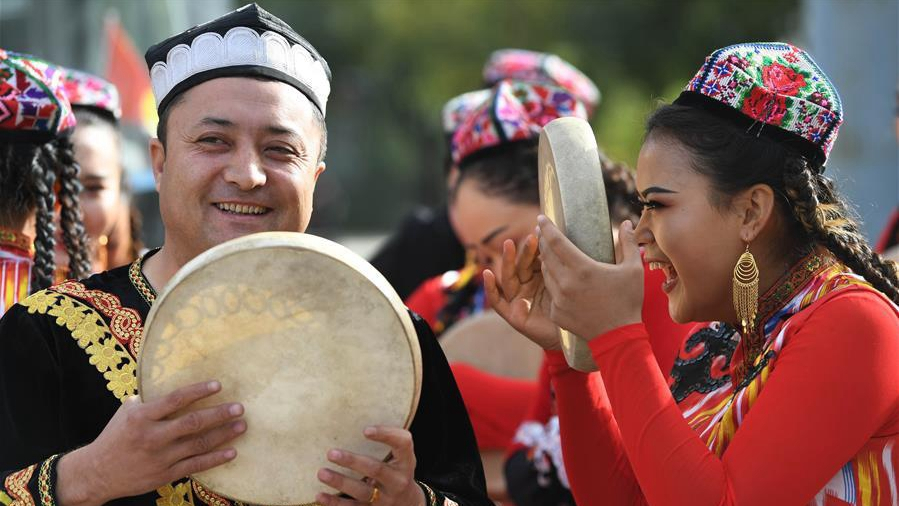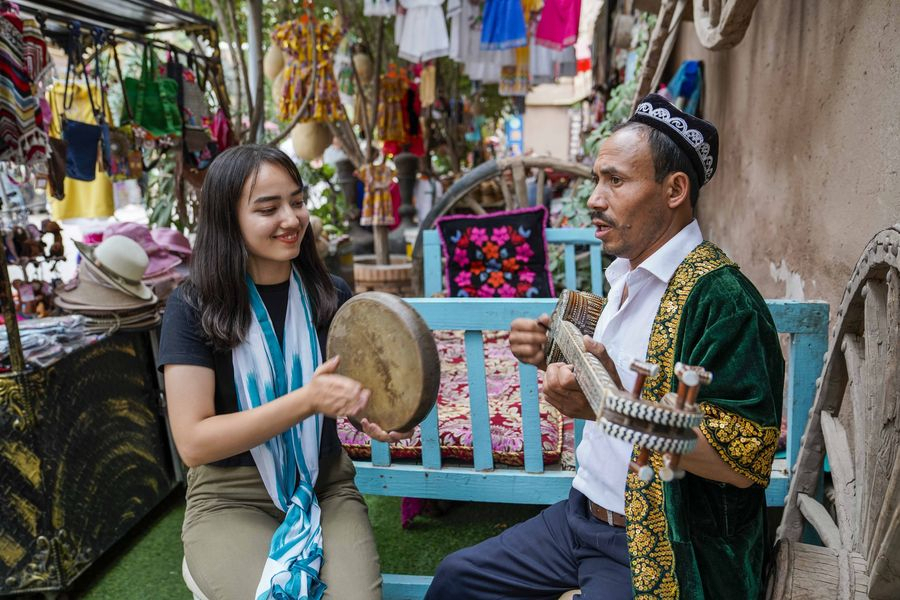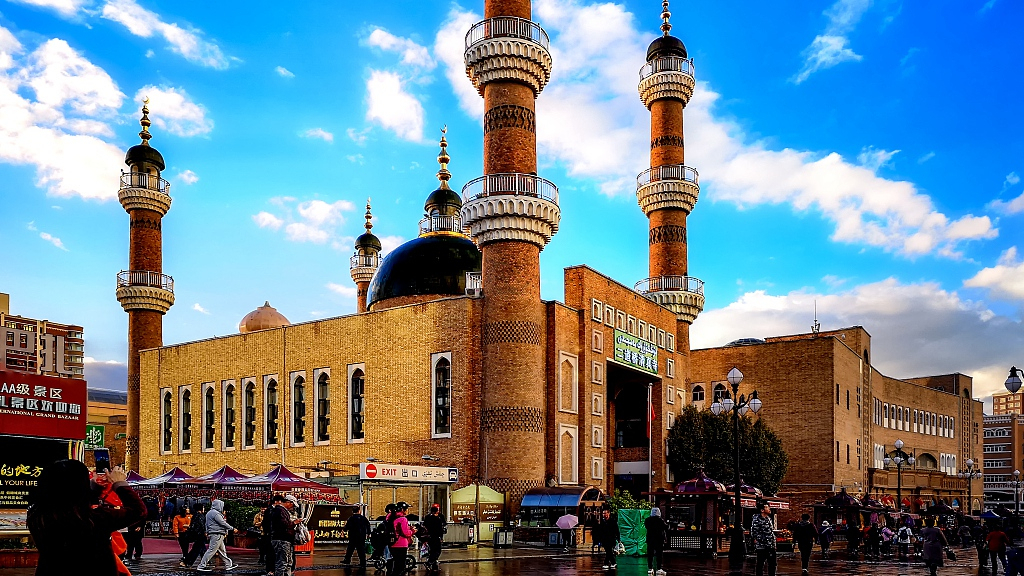Authorities in northwest China's Xinjiang Uygur Autonomous Region refuted on Wednesday the rhetoric that ethnic minority officials are marginalized in Xinjiang.
Elijan Anayit, spokesperson for the Information Office of the People's Government of Xinjiang, made the remarks at a press conference on matters pertaining to Xinjiang on Wednesday.
Xinjiang officials present at the press conference also hit back at allegations made by foreign media outlets that Xinjiang "forbids ethnic minorities from wearing ethnic costumes, forcing them to celebrate the Spring Festival," stressing that Xinjiang fully protects the dietary, celebratory, wedding and funeral rituals, and other customs of all ethnic groups.
Authorities also addressed questions from reporters on other Xinjiang-related issues.
Q: What Xinjiang has done to promote ethnic unity, and what results have been achieved?
A: Xinjiang fully implements the ethnic policies of China and upholds ethnic equality.
First, all ethnic groups in Xinjiang, regardless of their population, development and religious belief, are equal and entitled to all legitimate rights and interests, including participating in the management of national affairs, the freedom of religious belief, receiving education, using their ethnic spoken and written languages, carrying on their traditional ethnic cultures.
Seventy percent of the annual fiscal revenue of the Xinjiang Uygur Autonomous Region is spent on guaranteeing and improving the people's livelihood, to which all ethnic groups have equal access. Through an array of employment, culture, education, and medical care projects, the quality of people's lives have greatly improved.
Second, continuous efforts have been dedicated to ethnic unity and solidarity. For example, since 2016, the campaign of "Family of Ethnic Unity" has paired up 1.1 million officials with over 1.6 million families of people from different ethnic groups. The officials help local residents increase their income in various ways and solve difficulties in seeing doctors, employment, schooling, and other aspects of life and work.
Third, consistent efforts have been made in promoting ethnic unity education and activities in government agencies, villages, communities, schools, enterprises, military camps, regiment farms, and religious venues.

A culture and tourism festival themed on Dolan and Qiuci culture in Awat County of Aksu Prefecture, northwest China's Xinjiang Uygur Autonomous Region, October 25, 2019. /Xinhua
A culture and tourism festival themed on Dolan and Qiuci culture in Awat County of Aksu Prefecture, northwest China's Xinjiang Uygur Autonomous Region, October 25, 2019. /Xinhua
Q: Some foreign media claim that "ethnic minority officials are marginalized in Xinjiang". Is it true? What measures has Xinjiang taken to cultivate and appoint ethnic minority officials?
A: China has always attached great importance to selecting, cultivating, and employing ethnic minority officials and professionals. Since 1954, the central government has launched training sessions for Xinjiang-native ethnic minority officials. A total of 4,635 officials at or above county-head/division-chief level have been trained, among whom 2,771 are ethnic minorities, accounting for 60 percent of the total.
Since 1992, the central government has also launched a special program on cultivating professionals among ethnic minorities in key science and technology posts. As of 2019, the program had trained a total of more than 5,900 medium-to-high level such professionals urgently needed in the region.
The allegation that "ethnic minority officials are marginalized in Xinjiang" is groundless.
Q: Some overseas media claim that Xinjiang forbids ethnic minorities to wear their ethnic costumes, forces them to celebrate the Spring Festival, and forces removal of all Muslim signs. Is it true?
A: Xinjiang strictly follows the constitutional and legal provisions and fully protects the dietary, celebration, wedding and funeral rituals, and other customs of all ethnic groups.
In order to ensure the special food supply for ethnic minorities, especially for Muslims, we have required all big and medium-sized cities as well as small towns with Muslim populations to maintain certain numbers of Muslim restaurants and build Muslim canteens or restaurants on main roads.
All ethnic groups can enjoy legal holidays and their own festivals such as Corban Festival and Eid al-Fitr. The government also takes measures to allocate special land for cemeteries.
In Xinjiang, everyone has the right to freely choose their clothing without any interference from authorities. You can see people of all ethnic groups wear their own ethnic costumes.
Moreover, there is no such thing as "forceful removal of all Muslim signs." Anyone who has visited Xinjiang knows that Muslim restaurants can be seen everywhere in the streets.
Q: There are accusations that the purpose of promoting learning and using mandarin Chinese is to assimilate ethnic minorities. What is your response?
A: Ethnic languages are extensively used in different areas in Xinjiang. For example, multi-language signs and texts could be seen everywhere in Xinjiang, such as commercial tablets, postal and telecommunication services, medical and health care institutions, and public traffic signs, etc.
When administrative agencies carry out public affairs, they will use both mandarin Chinese and the languages of the ethnic groups. For example, Xinjiang People's Broadcasting Station broadcasts 12 programs in five languages – Uygur, Chinese, Kazak, Mongolian, and Kirgiz.
For those who say that the promotion and use of standard national language is to dilute ethnic consciousness, they need to ask themselves why learning a new language necessarily leads to the mother tongue being forgotten.

Local residents play music for tourists in the old town of Kashgar, Xinjiang, July 9, 2019. /Xinhua
Local residents play music for tourists in the old town of Kashgar, Xinjiang, July 9, 2019. /Xinhua
Q: A lot of work has been done in cultivating religious staff in Xinjiang. Could you brief us on that?
A: The government has attached great importance to the cultivation of Islamic clergies. In September 2017, a new campus of Xinjiang Islam Institute was established, with eight branches around the region, including those in Yili, Urumqi, Hotan, and Kashgar.
In 2019 alone, more than 600 students graduated from Xinjiang Islam Institute, and its branch schools and their newly enrolled students reached over 1,000. Students at Xinjiang Islam Institute and its branches can get 600 yuan of board expenses per person per month during their studies on the campuses. The accommodation of poverty-stricken students is totally free of charge, and 90 percent of the students can enjoy 4,000 yuan of scholarship or subsidies.
I heard recently that some politicians and media outlets in the U.S. spread rumors that the Xinjiang government detained unrecognized religious staff, and some of them were even prosecuted to death. I want to clarify that our government has never prosecuted anyone, let alone prosecute anyone to death.
The criminals who have been prosecuted are neither religious personages nor religious staff. They are criminals who spread extremism and engage in separation, infiltration, sabotage, and terrorist and extremist activities under the banner of Islam.
Q: We notice that a report issued by the website of "Uyghur (Uygur) Human Rights Project" claims that China uses refusal to renew passports as a weapon to force overseas Uygurs to return to China for "extrajudicial detention or imprisonment." Is that true?
A: The "Uyghur (Uygur) Human Rights Project" was supported by certain American non-governmental organizations. It has carried out so-called investigations to attack China's policy on Xinjiang under the guise of academic research.
According to our knowledge, most passport renewal or re-issuance requests by applicants from Xinjiang have been accepted and approved by Chinese embassies and consulates. Very few of them were refused as their applications failed to qualify Chinese laws, or they were suspected of being involved in terrorism-related activities.

A mosque in Urumqi, Xinjiang, China, September 25, 2018. /VCG
A mosque in Urumqi, Xinjiang, China, September 25, 2018. /VCG
Q: Recently, a PBS documentary called China Undercover, criticized the policy of establishing vocational education and training centers in Xinjiang. It alleged that Xinjiang suppressed ethnic Muslims such as Uygurs through obtaining their DNA and using facial recognition. How do you respond to that?
A: The documentary is full of lies and fallacies. They pieced together interview footage that is groundless and distorted to produce false stories.
For example, the documentary claims that Xinjiang is making use of surveillance technology, including facial recognition, to suppress Uygurs and other Muslims. But the installation of surveillance cameras is designed to protect our people, and the system doesn't target any specific ethnicity. The measure has strengthened people's sense of security and thus is broadly supported by all ethnic groups in Xinjiang.
In comparison, we need to be aware that as early as 2010, the UK installed 4.2 million surveillance cameras, covering all its streets, alleys, and motorways, accounting for 25 percent of the world's total. Police in New York also set up an urban surveillance system to track pedestrians and vehicles at every corner. Why are the systems practiced by Western countries considered as human rights protection while those by China as a violation?
The documentary also uses satellite images that resemble construction sites as evidence for the existence of so-called "detention camps." But the producer perhaps has never been to the site and therefore has no basis for claiming that the sites are "detention camps."
On top of that, vocational education and training centers are law-based education and training institutions set up to eradicate terrorism and religious extremism. Those who have visited the centers all know they are well-equipped educational institutions where trainees are taught standard spoken and written Chinese, laws, and skills.
(CGTN's Sun Ye also contributed to this story.)